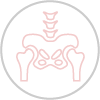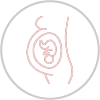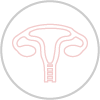The immediate weeks and months after the birth of your baby is an important time for your body. Your body undergoes many changes during pregnancy and continues to change postnatally. It is important to address any issues that occur at this time so as to prevent problems later in life.
Childbirth can lead to pelvic floor trauma, perineal tears and pudendal nerve injury. Consequently, the pelvic floor can become dysfunctional and you may experience urinary and/or bowel urgency and/or incontinence, pain, prolapse or difficultly with intercourse. You may have had a C-Section, struggling with separated tummy muscles, suffer poor abdominal strength or scar pain. You may be wondering how to regain strength, exercise or fitness and become ‘Fit For Purpose’ again.
An assessment by a Specialist Physiotherapist is important to establish the cause of any symptoms you may be suffering from, and provide specific and personal care, support and treatment to improve these symptoms. A Women’s Health Physiotherapist can assess you at any point during your post-natal period, although, may not offer you an internal examination for pelvic floor assessment until you’ve had your post-natal check at 6-8 weeks with your GP.
Please see the list of symptoms and conditions that you may be suffering from to understand more about how physiotherapy can help……








